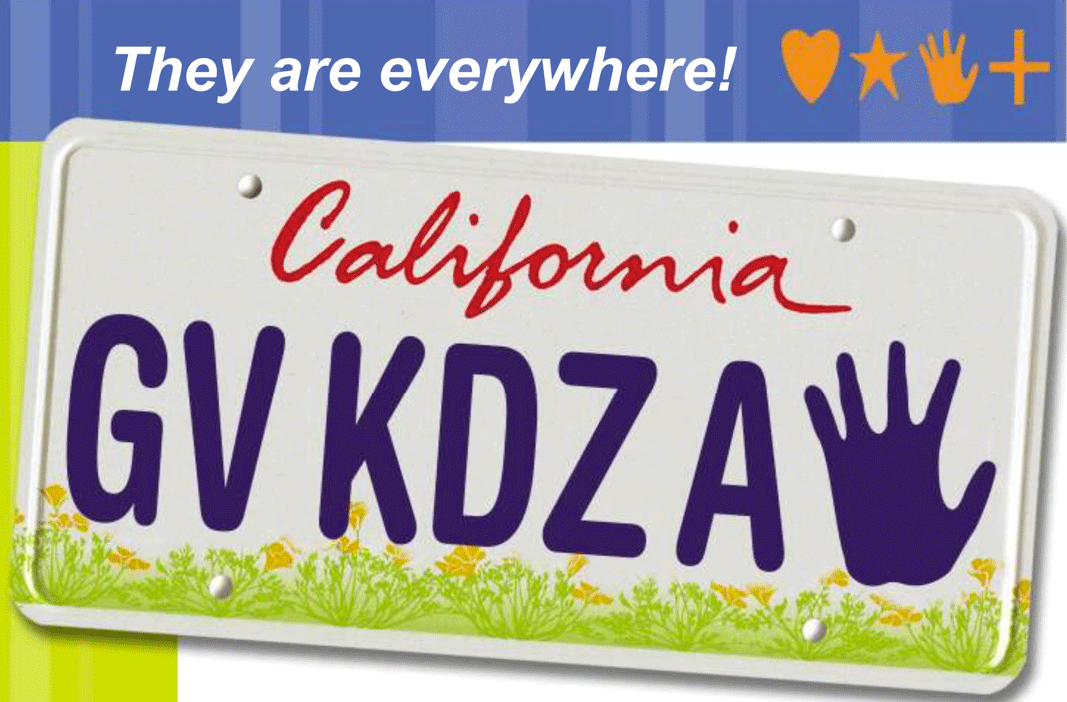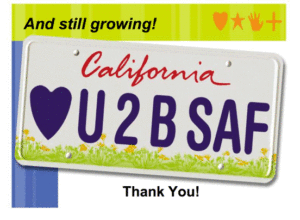California Kids' Plates Program
The California legislature passed a bill in 1992 for the sale of Kids' Plates specialized vehicle license plates and the creation of the Child Health and Safety Fund. Revenue from the sale of Kids' Plates, which contain an embossed heart, hand, star, or plus sign, goes into the Fund and is used to support three significant child health and safety issues in California
The Safe and Active Communities Branch’s (SACB) State and Local Injury Control (SLIC) Section oversees and administers the portion of the Child Health and Safety Fund dedicated to preventing unintentional childhood injuries, the leading cause of death for California’s children from ages 1 to 18. Using funding generated by the sale of Kids' Plates, SLIC provides funding to local entities to support and encourage the use of best practices to address this devastating public health issue.
Since 1998, SLIC has made over 700 awards throughout California to reduce or eliminate unintentional injuries in children and youth, focusing on areas such as:
Kids’ Plates Special License Plates – California DEPARTMENT OF MOTOR VEHICLES (DMV)
Have A Heart, Be A Star, Help Our KIDS
The Kids auto and commercial license plates can be ordered online.
The Kids trailer plates can be ordered with the Special Interest License Plate Application (REG 17).
More information about motorcycle Kids license plates.
The fees collected from the Kids Specialty License Plates are deposited in the Child Health and Safety Fund and used for programs that keep California kids safe, which include child care safety, child abuse prevention, and efforts to prevent childhood injuries.
Kids’ Plates Local Coalitions to Prevent Childhood Injuries Program
The purpose of this program is to fund existing local coalitions that will implement projects for childhood unintentional injury prevention using best practices and evidence-based programs. The SACB/Kids’ Plates Program will support the provision of Technical Assistance And Training to build individual and organizational capacity to strengthen local coalitions and to implement effective childhood unintentional injury prevention programs.
Each local coalition participating will receive a designated amount per year to support TAT that is required and approved by CDPH/SACB.
The TAT that the awarded contractors will receive include a needs assessment; one-on-one technical assistance; webinars; regional meetings; and a large meeting/conference. Topics will cover KP childhood unintentional injury prevention areas as well as coalition and program development. Networking between contractors and the provision of intensive TAT on coalition building strategies and program implementation skills will build the unintentional injury community through the sharing of experiences and knowledge.

CCCSH Technical Assistance And Training for Kids’ Plates Program
The California Coalition for Children’s Safety and Health (CCSH) is the TAT provider for this local coalition development program for the Department of Public Health Safe and Active Community Branch Kids Plate program staff and CA DPH Kids Plate Program local coalition participants. The project timeline for CCCSH will be Oct 2017 through Feb 29 2020, with the grantee projects timeline June 1, 2018 through Feb 29, 2020.
The specific best practice topics that will be covered by CCCSH in this TAT capacity, will be determined through working with the project’s Advisory Committee, Kids Plate local coalitions and in coordination with the DPH SAC Branch staff. The delivery of the best practice information and materials will be delivered through a webinar series, conference calls, regional face-to-face meetings, an annual statewide gathering in Sacramento, and individual coalition consultation overseen and staffed by CCCSH. CCCSH will create, convene and host a “kitchen cabinet” Advisory Committee made up of leadership from local coalitions, DPH SAC KP staff, CCCSH project staff and other key unintentional injury coalition experts upon invitation by TAT.
CCCSH’s TAT scope of work
There are five activities in the TAT plan:
Advisory Council: The TAT will bring together an “Advisory Council” made up of representatives of the grantees and other unintentional injury stakeholders and coalition development experts. The Advisory Council will be our “kitchen cabinet” to advise the TAT which issues and best practices are the most meaningful for the KP local coalitions, and provide us a setting to discuss and share issues and information collaboratively. The Advisory Council will meet by conference call and webinar. Travel will not be required to participate in the Advisory Council meetings. The Advisory Council will be chaired by Cathy Barankin the TAT Project Administrator, with lead staff support from Steve Barrow, TAT Project Director. Steve ([email protected]) is your main contact regarding the Advisory Council.
Webinars and Conference calls: The TAT will host a series of webinars and other forms of electronic meetings. These informational meetings will be set up using easy to access internet and phone based meeting platforms. The focus of the webinars will be to explore and bring best practice coalition development information to the Kids Plates local coalitions.
The issues focused on during these webinars meetings will be identified by the TAT review of the coalitions involved with the Kids Plate grant program, and input from the Advisory Council members. Participation in the webinars will not require travel. There will be a need for local coalitions to have access to the internet and phone to participate in the webinars and associated conference calls. There will be at least six coalition development webinars in the second phase of the program period (July 1, 2018 – June 30, 2019), and a similar number during the third phase of the project (July 1, 2019 – February 2020).
A calendar of coalition development issue webinars will be posted and updated as early as possible to allow local coalitions to incorporate these important informational events into your own calendars. CCCSH will make every effort possible to provide repeat time periods for each webinar, resources permitting, to allow coalition leaders and staff to participate who may not be able to participate during regular work week hours. Gerry Root ([email protected]) is your main contact regarding TAT hosted webinars or similar meetings.
During this next 24 months CCCSH will also host separate webinars on best practice policy, program and resources involving the unintentional injury causes. We will pay particular attention to hosting these webinars on injury issues the Kids Plate local coalitions are working on at the local level. Kids Plates coalition development participants are not required to participate in these injury issue based webinars, but are welcome to participate.
Regional meetings: The TAT will host several regional face-to-face meetings to provide time to network, learn from each other and discuss further coalition development issues particular to your area of the state. These regional meetings will typically be kept to three to five hours in length, reducing a need for overnight travel, and will be held in as central of a location regionally as possible to cut down on drive time travel to attend. Cathy and Steve are the lead people to contact ([email protected] or [email protected]) for agenda and presentation development for Regional meetings. Gerry Root ([email protected]) is your lead contact to RSVP, if you have questions about attendance or if you are presenting or sharing materials at a regional meeting.
Annual statewide meetings: The TAT in cooperation with the Advisory Council and SACB, will host two annual gatherings in Sacramento. Kids Plates local coalition’s leadership and key staff will be required to attend both annual meetings. The purposes of these statewide annual meetings is to explore unintentional injury prevention coalition development issues that are common to all coalitions. This collaborative work will help build and support momentum toward a sustainable network of local coalitions, and provide opportunities to discuss policy, program and resource development issues needed to increase local coalition efforts across the state. Cathy Barankin and Steve Barrow ([email protected] or [email protected]) are your main contacts regarding Annual statewide meetings. Gerry Root ([email protected]) is your main contact for RSVP or questions about attendance to an Annual meeting and access to materials from the annual meeting, and post meeting.
One-on-One consultations: The TAT leaders will be available for one-on-one consultations over the phone, email and in-person to local coalitions. The one-on-one consultations provide a chance to address coalition development issues specific to your coalition or region. If one of our TAT staff cannot address the issue you need help with or want to share – but is beyond the TAT staff’s areas of expertise, CCCSH will work to help link you up with someone who can address the issue you are raising or sharing. Steve ([email protected]) is you main contact for scheduling or exploring the need for a one-on-one consultation.
Outcome and activities reporting: CCCSH is responsible for reporting on the outcomes of the five activities the TAT is responsible for under this grant project. If you have information to share that will help in the development of these outcomes, information can be sent to Cathy or Steve at ([email protected]) or ([email protected]).

